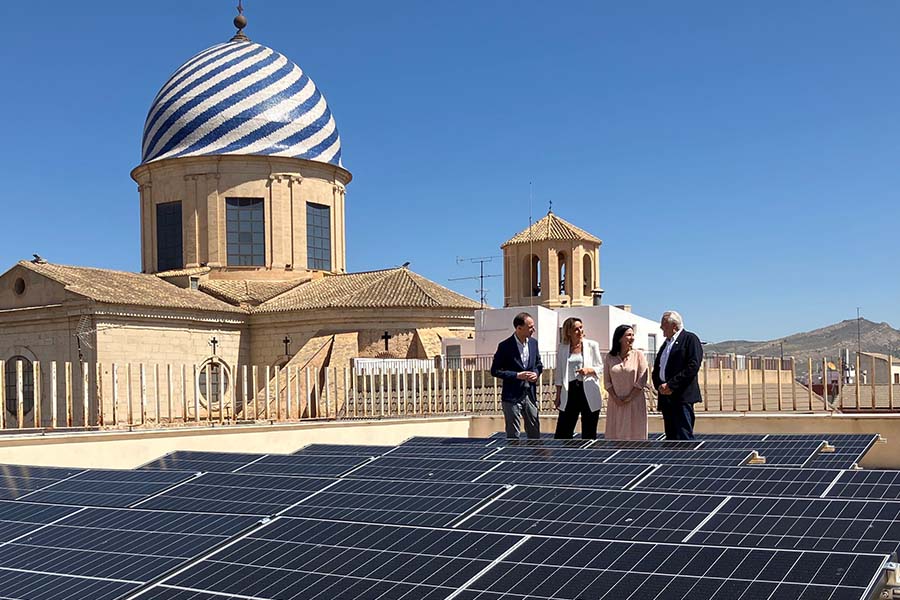Iberdrola España grants access to two self-consumption facilities to the Yecla Town Council
-
The Mayoress of the town, Remedios Lajara, has inaugurated the infrastructures installed in the School of Music and the municipal indoor swimming pool
-
They have an output of 35 kilowatts and will provide approximately 50,000 kWh of sustainable energy per year

Iberdrola España has granted access to two self-consumption facilities to the Yecla Town Council, which have been located on the roofs of the municipal swimming pool and the School of Music, as a sign of the Company’s commitment after undertaking its first photovoltaic project in the Region, located in the municipality of Yecla.
The infrastructures located on the roof of the municipal swimming pool and the School of Music will have a total output of 35 kilowatts (kV) and will generate 50,000 kWh/year of sustainable energy for their own consumption − achieving a renewable, efficient and decarbonised supply for these municipal facilities.
The Mayoress of the town, Remedios Lajara, inaugurated the self-consumption facilities accompanied by Sandra Machirán, head of Iberdrola Renovables in the Mediterranean area, and by the Company's Institutional Delegate in the Region, Miguel Ángel Cerdán, as well as representatives of local companies that have participated both in the construction of the facilities and in the implementation of the Peñarrubia photovoltaic plant.
For Remedios Lajara, these actions "are proof of the Council's commitment to energy efficiency. Two facilities that provide an environmental, economic and social benefit for the city of Yecla; and which are the result of the agreement signed between Iberdrola España and the Yecla City Council itself".
Sandra Machirán emphasised that for Iberdrola España "it is very satisfying to be able to contribute with these photovoltaic self-consumption facilities to making these two municipal buildings more sustainable, which from now on will consume the energy they generate, making them more efficient and doing our bit to improve the environment in which we carry out our activity".
First photovoltaic plant in the Region
Iberdrola España recently started operation of its first photovoltaic plant in the Region of Murcia in Yecla. The facility, called FV Peñarrubia and located next to the road to Jumilla, has a capacity of 50 megawatts (MW) and can produce clean energy to supply over 25,000 homes a year.
The photovoltaic project, which involved an investment of around €30 million, consists of over 90,000 photovoltaic modules that will generate more than 86,000 megawatt hours per year and avoid the emission of 15,000 tonnes of CO2.
This facility is in addition to the more than 160 megawatts of wind energy that the Company has installed in the area, thus reaffirming Iberdrola España's commitment to promoting renewable energies as a driver of development wherever they are implemented and fully integrating the conservation of the biological biodiversity of ecosystems into its strategy. With this, the Company demonstrates that the supply of competitive, clean and sustainable energy can coexist effectively with the environmental balance.
For this reason, the Company is implementing a series of environmental measures to promote the steppe habitat and its native species, favouring the nesting of little owls and other birds.
Iberdrola España launches the second edition of the Convive Awards
Iberdrola España has launched the second edition of the Convive Awards, which recognise and give visibility to initiatives, alliances, companies, actions or local entities that exemplify the integration of renewable energies with socio-economic, rural and agricultural development and the conservation of biodiversity in Spain.
This new call will be open on Iberdrola España's website between 3 June and 12 July 2024. Applications will be assessed according to these four criteria: socio-economic/environmental impact; alignment with the values of the CONVIVE programme in renewables, nature and people; collaboration and alliances between agents and replicability of the initiative/project. There will be different categories: local entities and citizen participation; innovative solutions and research; social and business entrepreneurship; communication and awareness, and youth.
